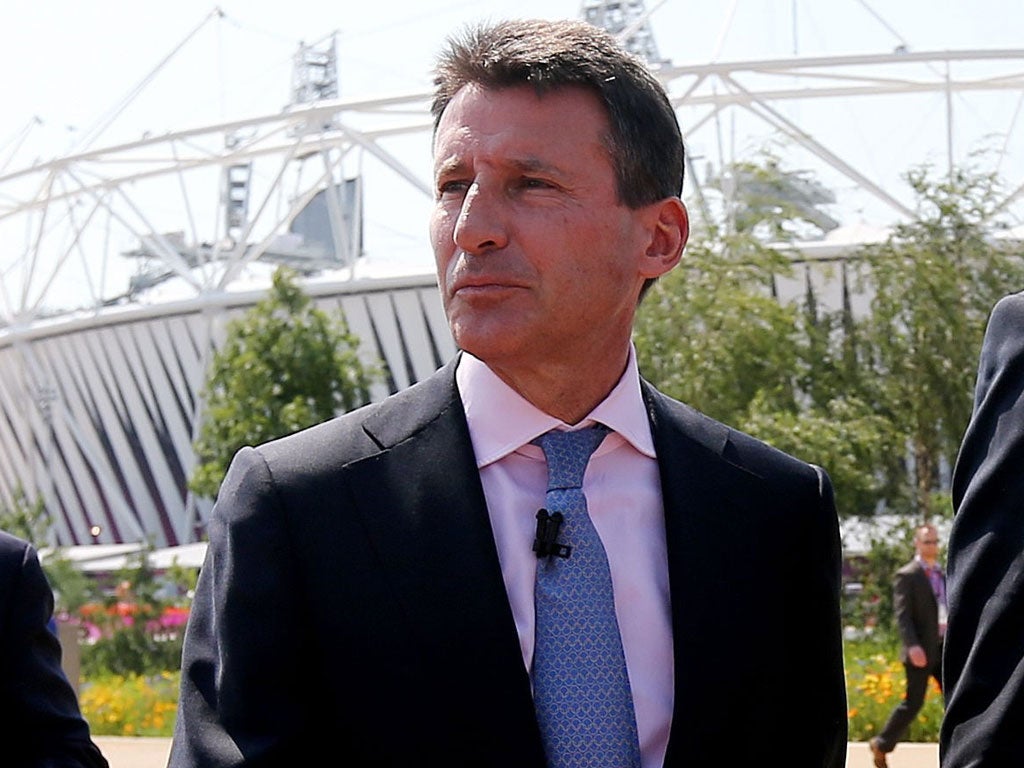Anyone who took an interest in the world of track and field athletics back in the early 1980s will find one aspect of the current Olympic Games a source of mild unease. I refer, of course, to the front-of-house role occupied by the former 800m and 1,500m world record holder and one-time Tory MP, Lord Coe.
Thirty years ago, when he appeared on television on an almost weekly basis with most of the world's middle-distance runners flailing vainly in his wake, Sebastian Coe was about the nearest thing this country possessed to the Corinthian ideal: clean-cut, nicely spoken, sporting, intelligent (there was a sensation when he was pictured descending an aircraft's steps with a copy of The Spectator under his arm), and as likely to have taken performance-enhancing drugs as to be guest vocalist on a Sex Pistols come-back album.
Here in 2012, on the other hand, Lord Coe's persona is necessarily rather different. He has now been reinvented as a corporate apologist-cum-reality softener, the man who, should it turn out that McDonald's and Coca-Cola have been secretly awarded the catering contract for dozens of inner-London schools, will have to face the cameras with a smile. At the same time, my own private sorrowings at the depths to which this hero of my late adolescence has been reduced are tempered by an awareness that what we have here is, broadly speaking, an elemental law: the absolute right of sporting heroes to carve out destinies for themselves that may not conform to the expectations of their fans.
In fact, looking at Lord Coe as he marches to the podium to defend some piece of official high-handedness, I was reminded of the moment, in about 1973, when I realised that the well-nourished gentleman striding towards me in the bowels of Norwich City FC's Carrow Road ground was Sir – as he now is – Geoff Hurst, then manager of Stoke City. "Please Mr Hurst," I quavered, "may I have your autograph?" Alas, he strode on. Then, I was hugely indignant at this slight. Now I realise that what might be called the Coe Principle applies and, just like anyone else, ex-professional sports people should be allowed lives of their own.
If one cannot admire the way in which Jeremy Hunt, the Culture Secretary, handles the business of his department, one may at least relish his absolutely colossal cheek.
Quite how Mr Hunt managed to hold on to his job in the aftermath of his appearance at the Leveson inquiry is one of the great political mysteries of the age, for he emerged from it horribly tainted by the reek of compromised loyalties.
You might have thought that his exposure as the Murdoch empire's Cabinet fixer might have encouraged Mr Hunt to keep his opinions to himself for a while. But no, there he was again earlier in the week hinting that future Olympic Games could be screened on Sky TV. Having recently shelved the last government's scheme for a review of key sporting events, including the World Cup and the Olympics, the Culture Secretary has declared that he will revisit the issue when the digital switchover is completed later this year. "We thought that was the right thing to do because the broadcasting landscape is likely to change," he innocently remarked.
As an example of sucking up to your friends while speaking the language of sweet, technological reason, this deserves some kind of award. Above it hovers a first principle which a government supposedly keen on inclusiveness – and even that enticing abstract, the national spirit – has never bothered to examine. Surely if an international sporting event involves the participation of a United Kingdom team, then it becomes a national spectacle, of potential interest to everyone, irrespective of their ability to afford a satellite dish, and not simply a means to inflate Mr Murdoch's profits? There are enough government-sponsored rips and holes in the national fabric already, without Mr Hunt wanting to unravel it even further.
Q: What is the link between Hello! magazine and the novelist George Gissing, author of such gloomy late-Victorian masterpieces as New Grub Street (1891) and Born in Exile (1892)? The answer, I discovered from reading Professor Pierre Coustillas's monumental The Heroic Life of George Gissing Part III: 1897-1903, is that Gissing, albeit indirectly, was responsible for our current use of the collective noun "paparazzi".
Visiting the southern Italian town of Cotrone in 1897, Gissing had the misfortune to lodge in a grim hotel ("not very comfortable", the food "very poor") named the Albergo Centrale, whose proprietor was a certain Corialano Paparazzo. Sixty years on, having come across a copy of Gissing's travelogue By the Ionian Sea (1900), in which Sr Paparazzo appears, Fellini gave this name to the seedy snapper in La Dolce Vita.
Trying to think of a comparable instance of baton-passing, I came up with the American rock band Death Cab for Cutie, whose name is taken from a song performed by the Bonzo Dog Doo-Dah Band in The Beatles' Magical Mystery Tour. But the Bonzos stole this from Richard Hoggart's celebrated socio-literary survey The Uses of Literacy (1957), where it features as the title of an imaginary and morally injurious gangster film. No doubt about it, cross-media cultural transmissions are almost as mysterious as Jeremy Hunt's ability to hang on to his job.


Join our commenting forum
Join thought-provoking conversations, follow other Independent readers and see their replies